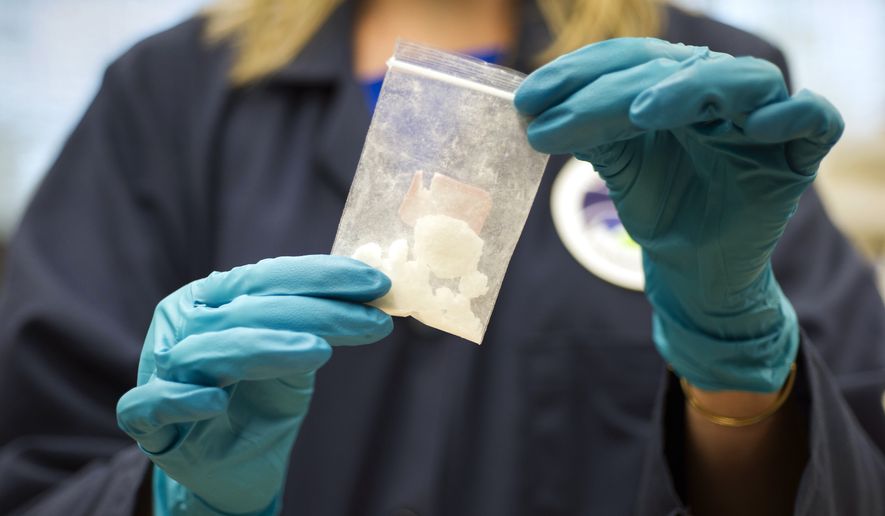One week before the midterm elections, seven members of Congress jetted to China with specific marching orders from the Trump administration and Ambassador Terry Branstad: Urge Beijing to crack down on fentanyl, the No. 1 killer in the U.S. overdose crisis.
Trade was also on the agenda, said Senate Health Committee Chairman Lamar Alexander, Tennessee Republican, but every meeting with Chinese Premier Li Keqiang, state police and Politburo members began by asking the Chinese government to make all forms of the synthetic opioid illegal.
Mr. Branstad and the White House wanted the delegation to act as table-setters for President Trump, the self-styled dealmaker in chief, who met with Chinese President Xi Jinping this weekend on the sidelines of the Group of 20 summit in Argentina.
The delegation’s lobbying campaign appears to have worked.
The White House said Mr. Xi over the weekend agreed at the summit to control all forms of fentanyl as both countries try to improve relations and end a thorny trade war. Officials said the change, if implemented swiftly and firmly, will fill a critical enforcement gap.
“If they get caught, they have the highest level of punishment,” Mr. Trump said while returning to the U.S. on Air Force One. “That could be a game changer.”
Roughly 30,000 Americans died last year from overdoses traced back to fentanyl, which is far more deadly than regular heroin. The drug is smuggled into the U.S. from Mexico or even mailed directly through the U.S. Postal Service — but invariably is traced back to China.
Chinese authorities have made other efforts at crackdowns by banning 25 compounds, but crafty traffickers riffed on formulas to duck authorities and continue shipping their products.
“Chinese weren’t yet convinced it was that important to us,” Mr. Alexander told The Washington Times. “They don’t have an opioid problem in China.”
Mr. Alexander and other lawmakers hailed the weekend’s developments, saying the crackdown is a long time coming and should work hand in hand with a new law that forces the U.S. Postal Service to demand advanced electronic data on all Chinese packages so customs agents can root out illegal drugs.
Sen. Chuck Grassley, Iowa Republican, said the change will save an “untold number of lives in the United States.”
There is a lot at stake. The U.S. opioids problem shifted in the past few years from pain pills and heroin to fentanyl.
Drug dealers cut their heroin supply with the potent drug, delivering a major high that keeps some customers coming back and killing others who don’t realize what they are injecting into their bodies.
Illicit fentanyl was responsible for more than 40 percent of the 70,000 drug overdose deaths in the U.S. last year and 60 percent of opioid-related deaths.
A recent U.S. government report identified China as the top supplier to the U.S. of illegal fentanyl and criticized the Chinese government for being “slow and ineffective” at keeping up with numerous variations of the drug that are more potent and deadly.
American officials said previous Chinese efforts to schedule a set of fentanyl compounds resulted in a sharp and immediate decrease in those chemicals entering the U.S.
“China has already listed 25 forms of fentanyl as illegal, but then the crooks are creative and they create a new form of fentanyl that is not illegal,” Mr. Alexander said. “We persuaded them to take the handcuffs off the Chinese police and say every form of fentanyl is illegal.”
China is copying the U.S. in a way.
The Drug and Enforcement Administration decided this year to take all forms of fentanyl without accepted medical use and place them in the Schedule I list denoting the highest risk of abuse.
“China has now done the same thing, so anyone who possesses, imports, distributes or manufactures any illicit fentanyl analogue will be subject to criminal prosecution in the same manner as for fentanyl and other controlled substances,” DEA spokesman Melvin Patterson said. “This will make it easier for Chinese law enforcement and prosecutors to prosecute traffickers of all forms of fentanyl-related substances.”
In a statement, Chinese Foreign Minister Wang Yi confirmed that China “has decided to list all the fentanyl-like substances as controlled substances” and agreed to take “proactive steps to strengthen cooperation on law enforcement and combating illicit drugs.”
Mr. Alexander said the deal is an important breakthrough for two countries trying to work through a thorny trade war.
“People can disagree, but it helps to have a good relationship when you’re working out a problem,” Mr. Alexander said.
He also said it’s an image-booster for China.
“This will turn China from being world’s leading supplier of fentanyl,” he said, “to the world’s leading country doing something about it.”
• Tom Howell Jr. can be reached at thowell@washingtontimes.com.
• Laura Kelly can be reached at lkelly@washingtontimes.com.




Please read our comment policy before commenting.